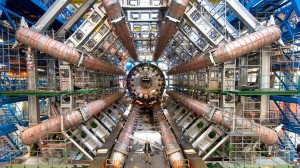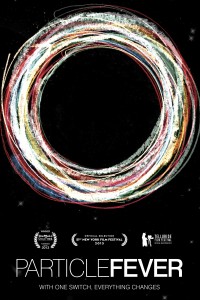Who would’ve thought a film about subatomic physics could be so stirring and virtuous? As a battered survivor of college Physics 101, I half-anticipated I would merely endure Particle Fever for the sake of geekier family members. But surprisingly, this movie far surpassed my expectations as the best new documentary I’ve seen this year.
Particle Fever succeeds as a tale of suspense on two levels. First, it tells of the efforts to prove the existence of the Higgs boson particle. Those of us who followed the news in 2012 know how this saga ended, but even so, Mark Levinson’s direction and storytelling sweep us up in the events at CERN (European Organization for Nuclear Research) on the French-Swiss border.
Levinson wisely chose to follow six theoretical and experimental physicists heavily invested in this endeavor’s outcome, so the narrative unfolds through their collective eyes. Happily, each of these men and women are passionate, expert communicators. Courtesy of their elucidations and some crafty graphic work, I now comprehend what was at stake in Geneva from 2007-2012 (and this from someone who gave up on Stephen Hawking’s A Brief History of Time and Lawrence Krauss’ A Universe from Nothing).
To summarize, the Higgs boson had long been the missing core of the Standard Model of Particle Physics, theorized to give all particles mass and hold all matter together, allowing the formation of atoms. Minus the appearance of this elusive puzzle piece, the Standard Model would fail to cohere. The Large Hadron Collider (large indeed, the hugest structure ever built by humans) would attempt to smash protons together at nearly light speed, allowing supremely sensitive cameras to image the subatomic particles emerging from the collision, including, hopefully, the Higgs boson.

The second item of suspense in Particle Fever, the mass of the Higgs boson, may not seem like a big deal, but the outcome of this inquiry possessed much significance. A lighter boson would steer physicists towards a fine-tuned, elegant universe of Supersymmetry; a heavier particle would indicate a chaotic, dangerously unstable multiverse.
If all of this sounds dry and tedious, fear not, the scientists are delightful to see at work and play. CERN physicists rap goofily, yet (no shock here) with smart, informative lyrics; and clichéd as it may be, it’s still funny to watch geniuses of esoteric theory struggle to get audio on their laptops. Most importantly, the joy of discovery carries us vicariously along with the researchers’ triumphs and setbacks.
The life stories of Particle Fever’s protagonists sometimes overflow with drama, too. As children, two of the theoretical physicists escaped war and persecution by fleeing Iran and Turkey with their parents. Such experiences contrast with the peaceful cooperation of the CERN scientists, numbering 10,000 and hailing from over 100 nations.
In addition to subsuming personal ambition and national identity to a higher cause, the researchers also abundantly exhibit the twin virtues of patience and perseverance. Construction of the Large Hadron Collider began in the mid-1980’s, and some of the theoretical physicists we meet have waited 30-40 years to see if their life work will be validated by experimental data. The Turkish-born scientist, Savas Dimopoulos, eloquently compares this scientific waiting game to making good coffee, which only takes a few minutes to brew and can be quickly discarded if the resulting concoction tastes poorly. No such luck for these heroically forbearing figures!
Invigorating, too, is the pursuit of knowledge for its own sake. At one point, an economist quizzes David Kaplan, a theoretical physicist from Johns Hopkins, about the potential gain from these experiments. Kaplan unflappably responds, “I have no idea…It could be good for nothing, except for understanding everything.” (Did I mention these chaps are highly quotable, too?)
I suspect that 20 years from now, this film will be considered a valuable historical document for its rendering of pivotal scientific events. What a treat that Particle Fever also infuses its viewers with understanding, along with hope in seeing that our better selves sometimes carry the day.
(Particle Fever was not rated by the MPAA. The film contains occasional salty language, but I would urge its viewing by all scientifically inclined teens and inquisitive adults.)
5 out of 5 stars














